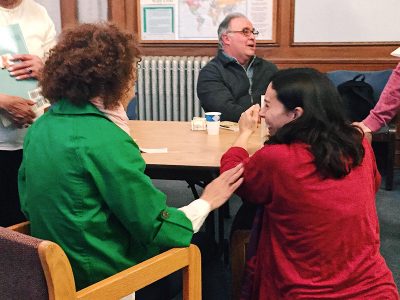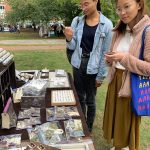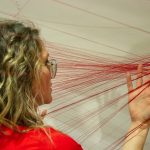
Ricardo Calleja said he was 12 years old when he left the political unrest of Cuba behind to immigrate to the United States.
Faced with the task of learning English, adapting to strange foods and struggling with homesickness, Calleja was forced to find a way to “adopt a new language and culture without losing [his] own in the process,” he said.
He found a way to do this in poetry.
“Poetry allows us to zero in on what’s essential,” Calleja said. “We left [Cuba] with a lot of bitterness. For me, it was almost like a divorce that I had to solve in my mind.”
Calleja read a selection of his poems Sunday afternoon at Brighton Allston Congregational Church at the “Bridging Two Cultures” poetry reading.
Calleja, a Boston University alumnus who has lived in Boston ever since leaving the small town of San Luis, Cuba, said he organized the event to share the “difficult blessing of having grown up in two cultures with two languages.”
To read alongside him, Calleja invited two of his former colleagues from Brookline Public Schools: María Marrero and Tanya Montás Paris, both of whom also grew up straddling two cultures.
Marrero, originally from Puerto Rico, said “poetry came in search of [her].” She said her mother learned to read using poetry and taught her poems growing up.
Marrero then went on to teach poetry to her English as a Second Language students in Brookline, as she said the format made it easier to put together thoughts without worrying about grammatical technicalities.
“I’ve always loved poetry,” she said. “It’s the language that anybody can access.”
This sentiment rang especially true for Paris, who was 19 years old when she emigrated from the Dominican Republic, she said. Because of this, her poetry is more bilingual — in her words, the Hispanic voice she brings to her poetry is “more recent.”
“Now I think I have two homes,” she explained. “The home for my heart, the Dominican Republic, and the home for my brain, because this [country] is where I feel like I became an adult.”
This transitional experience and feeling of having “a leg there and a leg here” inspired many of Paris’ poems, she said. Before each piece she read at the event, she explained the catalyst behind it: homesickness, an abusive relationship and discrimination based on her accent and the color of her skin.
“Sometimes your poems and your stories come and grab you, they grab you silly,” she said. “You don’t know when, but it feels great to let it go. Once you write it down, it’s like that thought, that feeling, is free.”
In addition to the emotional, personal aspect of writing poetry, Calleja described a larger purpose. For him, he said poetry is his “contribution” to the world of storytelling, of which he is also a consumer.
“More than anything, I feel that not enough people have a voice,” Calleja said. “A lot of the stories of our culture are manufactured by these professional people that a lot of time are not in touch with real communities.”
He recalled attending a poetry reading led by an “academic” and not understanding the message of the person’s work. Because of this, Calleja encourages more spoken word poetry and accessible language, particularly when people write about what’s important to them, he said.
Marta Fuertes, a Spanish teacher at Brookline High School who attended “Bridging Two Cultures,” said the poetry she heard embodied this notion of accessibility and relatability.
Originally from Spain, Fuertes now lives in Somerville. She said she came to the event not only to support her friends, but also to introduce her 7-year-old son to poetry and the “joy of reading out loud.”
“I live in a bicultural, bilingual world, so many of the topics that were repeated in the poetry resounds with me,” Fuertes said.
Paris said the bicultural existence is incredibly important.
“Our voices need to be represented. Our books, our poems, need to be in the bookstores,” Paris said. “… It took a lot of courage for me to come out as a writer. I wanted for my students, for my kids, for the children in my family to connect, to see themselves in these poems, to see themselves in these books.”




